So, you've thrown the cord and launched yourself into the world of cord cutting. But what now? How do you know which services you subscribe to? Is it possible that there are too many streaming TV services to choose from these days?
You browse through the libraries of Netflix, Amazon Prime Video, and Hulu, and watch some of your favorite shows on each — you subscribe to all three. But wait, you still want to be able to watch live TV, so you add a subscription to Sling TV or PlayStation Vue Sling TV vs. DirecTV Now vs. PlayStation Vue:How do they compare? SlingTV vs. DirecTV Now vs. PlayStation Vue:How do they compare? In this article, you'll learn the differences between the three major OTT Internet TV streaming services:Sling TV, DirecTV Now, and PlayStation Vue. Read more too.
It's probably best to get a subscription to Britbox or Acorn TV BritBox vs. Acorn TV:Which is better for streaming British TV? BritBox vs. Acorn TV:Which is better for streaming British TV? Between BritBox and Acorn TV, you can stream the best British TV content. But which one should you subscribe to? Which is better? Also read more - your partner loves classic British comedy. And what about the children? They'll definitely want a login for Disney's next streaming service Disney is pitching a rival streaming service. Netflix Disney is pitching a streaming service to its rival. The deal with Netflix is coming to an end. Read more.
Suddenly, you're back where you started. Every month you pay the same amount of money you paid for cable, and all you've achieved is a more fragmented service.
You are not alone. This paradox is a growing problem for cord cutters. Let's take a closer look at the topic.
Do you subscribe to Spotify, Google Play Music, or one of the other mainstream music streaming services Spotify vs. Apple Music vs. Google Play Music:which is the best? Spotify vs. Apple Music vs. Google Play Music:Which is the best? While there are a plethora of music streaming services out there, there are three main ones that stand out above the rest:Spotify, Apple Music, and Google Play Music. But which one is better? Read more ? If so, how did you establish which service was right for you? How to choose the best music streaming service for you? How to choose the best music streaming service for you? Do you use a streaming music service? If so, how do you know you're using the best one for you personally? Read more ?
His decision was almost certainly not based on the availability of music. With a few notable exceptions, the same song selection is available across all apps. Instead, factors like price, user experience, and integration with your other hardware likely drove your decision-making process.
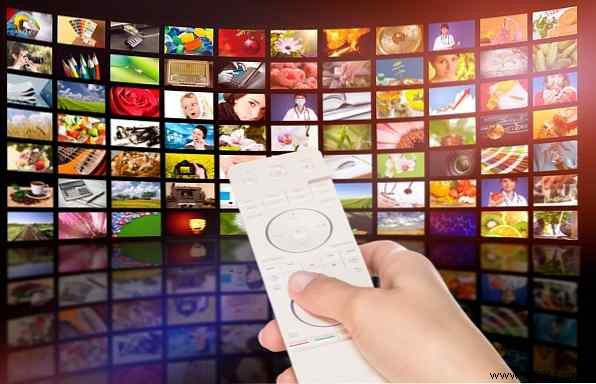
TV shows and movies, however, are a different ballgame. Unlike Spotify, which largely only has to deal with record labels, services like Netflix are navigating a minefield of movie studios, TV networks and distributors. Not to mention the complex licensing issues, which differ from country to country.
The end result of all this complexity is fragmentation.
In recent years, two things have become apparent:
First, the old model of cable TV is failing (arguably has already failed).
Second, people seem to want a single video-on-demand provider, and they want that provider to be Netflix. After all, people only had one cable TV provider, why should it be carried on a different channel?
Claims are confirmed by the facts (via Fortuna ):
With statistics like these, it's hard to see how the future is anything but rosy for both Netflix and cord cutters. But dig a little deeper, and things get a little trickier.
Much of Netflix's success so far has been based on licensing old content. But licensing content from other rights holders is expensive; at the end of 2016, the company owed more than $5 billion on TV show licenses alone.
Aware that its customers are now used to the idea of paying less than $10 per month, and that rights holders are raising the price of licenses to offset their falling profits, the company has increasingly focused in producing original content..
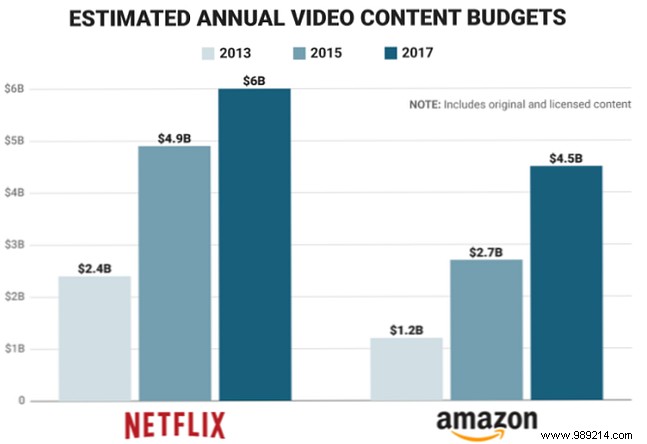
Many of their original shows have been massive successes:House of Cards , Orange is the new black , Narcos , Strange Things , The crown … the list goes on.
So what is the problem?
Netflix's status as the dominant streaming service is under threat, and with it is the concept of a unified streaming app.
Prime Video has followed a very similar path to Netflix. Amazon started licensing older shows from other networks, but has progressively spent more money producing its own content.
Like Netflix, Amazon is not short of money. It has a lot of reserve capital to pump into production – money traditional networks can only dream of spending.
The jewel in his crown is. The grand tour But his lesser-known original shows have also garnered plenty of critical acclaim. Transparent , The man in the high castle , Mozart in the jungle , and Bosch all have proven to be particularly popular.
In August 2017, Disney announced that it was cutting ties with Netflix to launch its own streaming service.
This move is understandable for two reasons.
First, Disney has a vast catalog of shows and movies on the back, which remain eternally popular with kids and adults alike. You know that people will sign up and that the service will make them a lot of money.
Second, if Netflix and the rest continue to produce more original content and reduce their licensing agreements, at the same time, people are canceling their cable subscriptions. Cut that cable! How to undo the cable Cut that cable! How to Get Rid of the Cord If you've read about the cord-cutting phenomenon but aren't sure where to start, here's a guide to cutting the cord and tearing down cable TV for good... Read More Disney is going to do something else? Keep your content in people's minds for the long haul? Remember, we are living in an age where DVDs represent "old technology" AND piracy is easier than ever.
Is this the beginning of the snowball? How many networks and other content producers are going to start their own streaming services? After all, we've already seen the UK's two biggest networks, the BBC and ITV, do something similar in the US with the launch of Britbox You Can Now Stream for British TV using BritBox You Now Now Stream for TV. Brit Using BritBox Thanks to BritBox, expats and Anglophiles can now stream British TV to their hearts' content. Read more . HBO and Fox have their own apps, and now Disney is launching its own apps as well.
At this stage, we don't know. But a look at some truths behind the production of TV content offers some clues.
En 2016, las empresas de televisión obtuvieron $ 73 mil millones en ingresos por publicidad. De esos $ 73 mil millones, la mayoría no se ganaba con los nuevos espectáculos que se realizaban a primera hora de la tarde. Más bien, venía de dos fuentes primarias:repeticiones en horario estelar de favoritos como Cómo me encontré con tu madre , La teoría del Big Bang , y La Ley y el orden , y deportes.
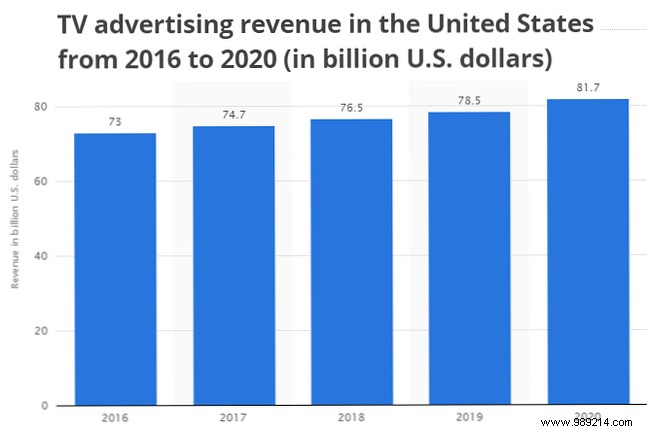
Los anuncios en sí mismos se venden por números de espectador, y las calificaciones son las principales. Si los números de audiencia disminuyen, las empresas publicitarias tienen que pagar más por persona. No tomará una caída masiva hasta que las empresas publicitarias simplemente se vayan, o al menos exijan condiciones financieras mucho más favorables..
Una disminución en los ingresos por publicidad tendrá tres efectos secundarios:
Recuerda, las redes estadounidenses ya se enfrentan a una ardua batalla para sobrevivir. En comparación con sus homólogos británicos y europeos, ya incluyen muchos más anuncios y ubicaciones de productos, trabajan con menos series, proporcionan menos efectos especiales y disparan menos episodios por serie.
Puedes sacar tus propias conclusiones, pero creo que es casi inevitable que veamos más “Disney” En los próximos meses y años. La transmisión en línea basada en suscripción se está convirtiendo en la única forma en que las redes pueden competir.
Miremos al futuro y cómo será la situación para los usuarios..
Si Amazon, Netflix y el resto continúan enfocándose en su propio contenido (y lo hacen con éxito), su lista de contenido con licencia disminuirá. Eso está claro.
Por lo tanto, hazte esta pregunta:¿En qué momento los servicios dejan de ser compañías de transmisión y comienzan a ser “Redes de televisión del siglo 21”?
Si muestran casi todo su propio contenido con algunas repeticiones populares de clásicos aquí y allá, hay nada Para distinguirlos de cualquier otra red..
Una de las mayores quejas de las personas con televisión por cable es la falta de “a la carta” suscripciones Por lo general, las compañías de cable ofrecen cuatro o cinco paquetes, y puede estar seguro de que el contenido que más le interesa (en general, deportes y películas) es el paquete más caro.
Irónicamente, parece que esos reclamantes podrían finalmente obtener su deseo. El futuro del entretenimiento de video no son los servicios de transmisión por cable o todo en uno. Es una suscripción a la carta online..
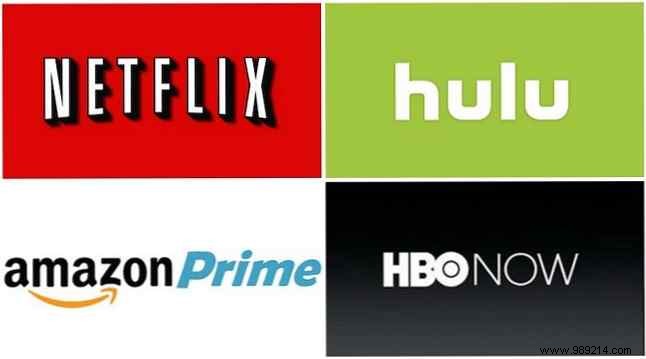
Si te gustan los programas originales en Netflix y ABC, y quieres ver deportes en vivo en Fox, esos son los servicios a los que deberás apuntarte..
Si quieres un “completo” paquete que representa de cerca la elección que tuvo con el cable, será ser posible, pero será le costará. Lo más preocupante para los cortadores de cables es que la diferencia probablemente no será tan diferente a los costos actuales de los cables, y eso es suponiendo que los precios se mantengan aproximadamente como hoy..
Francamente, depende de a quién quieras escuchar..
Según los hechos, parece que los consumidores argumentarían que uno, o quizás dos, está bien. Después de todo, mientras que Netflix alcanza el 75 por ciento de los hogares, el siguiente rival más cercano, Amazon Video, ni siquiera llega al 35 por ciento. Cuando se considera que gran parte del alcance de Amazon se debe a las suscripciones Prime, es evidente que los usuarios están contentos con la situación actual.
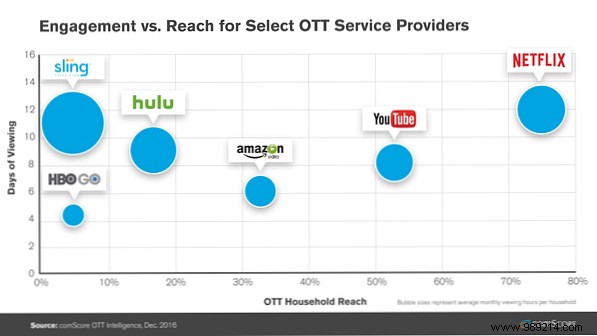
Después de todo, dado que la cantidad de horas que pasamos viendo televisión ha ido disminuyendo constantemente en los últimos años, necesitar múltiples servicios? Aparte de unos pocos fanáticos, ¿cuántas personas están tan desesperadas por ver un determinado espectáculo que se inscribirían en un plan de $ 10 por mes para ver eso y nada más??
Por otro lado, si escuchas las redes y los titulares de derechos, probablemente dirán que la elección es el rey:cuanto más servicios, mejor. Los consumidores pueden inscribirse en los que desean y las realidades de un mercado capitalista se encargarán del resto..
En definitiva, ambas partes hacen buenos argumentos..
¿Qué crees que depara el futuro para Netflix? ¿Continuará siendo el servicio de transmisión preferido incluso a medida que se fragmentan los mercados, o la falta de espectáculos clásicos combinados con más opciones a la carta traerán a las redes en conflicto de nuevo a la imagen??
Más importante aún, ¿cuántos servicios de transmisión crees que son demasiados? ¿Ya estamos llegando a un punto de inflexión? ¿O hay espacio para más servicios de transmisión de nicho? 10 Servicios de transmisión de nicho para aquellos que odian Netflix 10 Servicios de transmisión de nicho para aquellos que odian Netflix Los servicios de transmisión de corriente principal llevan contenido general. ¿Qué puedes hacer si quieres ver algo un poco menos convencional? Es mejor que revises estos servicios de transmisión alternativos llenos de contenido de nicho. Leer más para complementar los grandes jugadores? ¿En cuántos servicios de transmisión registraría en cualquier momento??
Como siempre, puedes dejar tus pensamientos y opiniones en los comentarios a continuación.!